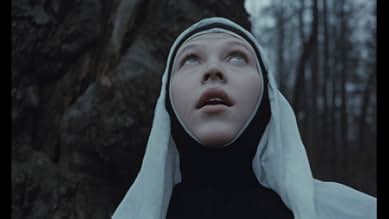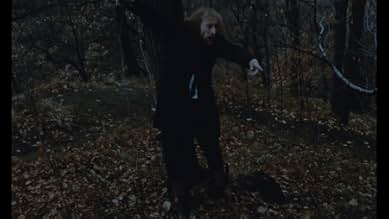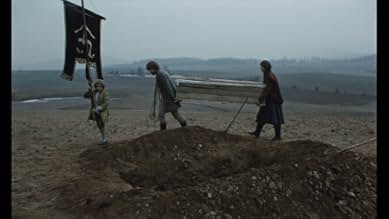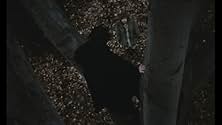IMDb RATING
7.0/10
3.3K
YOUR RATING
Young Polish noble Jakub, freed during 1793 Prussian invasion, experiences father's death, betrayal. Traumatized, he follows his savior, committing brutal murders across the country.Young Polish noble Jakub, freed during 1793 Prussian invasion, experiences father's death, betrayal. Traumatized, he follows his savior, committing brutal murders across the country.Young Polish noble Jakub, freed during 1793 Prussian invasion, experiences father's death, betrayal. Traumatized, he follows his savior, committing brutal murders across the country.
- Director
- Writer
- Stars
- Director
- Writer
- All cast & crew
- Production, box office & more at IMDbPro
Featured reviews
The previous poster calls the cruelty at display in this film "inhuman". Oh really? How come then that people slaughter people, gouge their eyes out, cut their limbs or burn them alive? Or torture them? Or rape and mutilate women? He should read some reports about practices during the Bosnian war or wars in Africa, about the stuff people have been doing to other people for ages, for reasons like religion, greed or lust. Or for no reasons at all. It took real "balls" or creative guts from the filmmaker to do a film like that. I am fed up with the political correctness and general blandness of films, caused by the requirements of market and profits, or by mere cowardliness. I could understand criticism of the cruelty if it was purely gratuitous but it is not. This film has artistic values and touches upon important topics. I am happy it was not destroyed and all copies not locked up somewhere. It could probably happen in Hollywood or in the lands like Iran.
Depravity, violence, a world permanently tipped off balance.
Near the end our halfmad protagonist asks someone else if he sees the world ugly because of his illness or because it is. The other replies that the world is filled with beauty, flowers, fruit, women, then reasons that he cannot adequately describe it. Instead he will dance about it.
His dance is not beautiful though, it's a wild spasmodic flailing of arms like we're seeing an epileptic suffer a seizure.
Diabel is that dance.
Superficially an allegory on how revolutions become mired in distraction - the political hedonism of power? - and how Poland has been used and abused by so many, deeper we find the same frightful pantomime that made Possession such a terrifying beast: inner soul made visible.
Slight problem is that he does not abstract enough to hit that bedrock were every image becomes multi-layered utterance of different cosmii. Characters remain pieces of the allegoric jigsaw, pawns in a game. There is not enough emptiness from life to pour into.
Near the end our halfmad protagonist asks someone else if he sees the world ugly because of his illness or because it is. The other replies that the world is filled with beauty, flowers, fruit, women, then reasons that he cannot adequately describe it. Instead he will dance about it.
His dance is not beautiful though, it's a wild spasmodic flailing of arms like we're seeing an epileptic suffer a seizure.
Diabel is that dance.
Superficially an allegory on how revolutions become mired in distraction - the political hedonism of power? - and how Poland has been used and abused by so many, deeper we find the same frightful pantomime that made Possession such a terrifying beast: inner soul made visible.
Slight problem is that he does not abstract enough to hit that bedrock were every image becomes multi-layered utterance of different cosmii. Characters remain pieces of the allegoric jigsaw, pawns in a game. There is not enough emptiness from life to pour into.
Thick smoke, nuns and screams. Crazy people and blood. Intense lighting and use of colour amidst the chaos. Each frame seems crowded - either through closeup or frenzy; moments of stillness are rare. Who is the stranger who saves Jakub? Why the nun? The madness of his surroundings - acrobats and theatricals, dancers and whores, mirror the insanity of the world. There is no goodness here. Monstrosity is the only answer.
Andrzej Zulawski's 'The Devil' is a real oddity from the early 1970s. Originally released in 1972, but banned at the behest of the Catholic church, it has been little seen, which is a pity, because it is a fascinating movie that deserves a larger audience. Reminiscent at times of Jodorowsky and sometimes Fellini, this is a very puzzling movie steeped in religious symbolism.
In 18th Century Poland the Prussian army are in the process of conquering the country. In the midst of this chaos a mysterious figure arrives at a convent with orders to escort a political prisoner. The prisoner, a young man named Jakub, was accused of attempting to murder the King. The man finds Jakub, and along with a young nun they flee the oncoming troops. Once they are safe Jakub is freed and urged to return home. When he arrives he finds that nothing is as before. His father burnt down the family home before committing suicide, his pregnant fiancee has married one of his friends, and his mother is a whore. Jakub is constantly described by others as being a lunatic or "sick" yet in many ways he appears to be the sanest one of the lot. To complicate matters the man who initially rescued him shadows his every move and seems to have a strange agenda of his own. Is Jakub mad or is the world? Who is the enigmatic stranger and what does he want of Jakub? 'The Devil' will appeal to fans of strange, multi-layered movies.
In 18th Century Poland the Prussian army are in the process of conquering the country. In the midst of this chaos a mysterious figure arrives at a convent with orders to escort a political prisoner. The prisoner, a young man named Jakub, was accused of attempting to murder the King. The man finds Jakub, and along with a young nun they flee the oncoming troops. Once they are safe Jakub is freed and urged to return home. When he arrives he finds that nothing is as before. His father burnt down the family home before committing suicide, his pregnant fiancee has married one of his friends, and his mother is a whore. Jakub is constantly described by others as being a lunatic or "sick" yet in many ways he appears to be the sanest one of the lot. To complicate matters the man who initially rescued him shadows his every move and seems to have a strange agenda of his own. Is Jakub mad or is the world? Who is the enigmatic stranger and what does he want of Jakub? 'The Devil' will appeal to fans of strange, multi-layered movies.
The devil epileptically dancing the beauty of the world in front of the eyes of a dying man, the victim of his deceit and evil schemes, how cruel, ironic and jaw-droppingly macabre that can be... and the dark blue unctuous atmosphere, the claustrophobic feeling that the mazy woods, the snow give despite the haywire dynamics in an open landscape, people like pawns spinning on a chessboard manipulated and controlled through their weaknesses by master puppeteers who use lust and envy and madness as levers of their domination, God represented by the constant presence of the nun, witnessing with a neutral frozen mercifulness the gyratory display of human delirium and the devil's catalytic actions.. I know now that only after seeing this sublime film and being impacted by it I've became a true Żuławski fan
Did you know
- TriviaThe film was banned in communist Poland.
- ConnectionsFeatured in Brows Held High: Häxan (2012)
- How long is The Devil?Powered by Alexa
Details
Contribute to this page
Suggest an edit or add missing content





























